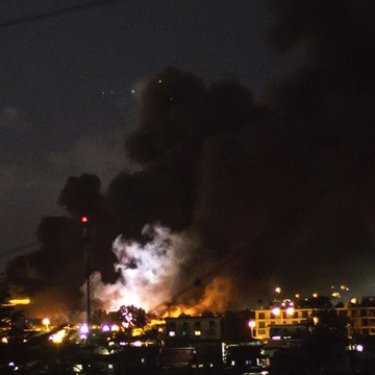Gabon: Post-election unrest leads to news blackout

Following the announcement of President Ali Bongo’s reelection victory, the unrest that erupted throughout the country is affecting all the media and is preventing journalists from working. Reporters Without Borders (RSF) calls for calm so that news and information can resume flowing in Gabon.
Internet and SMS connections were cut a few hours after the electoral commission proclaimed Bongo’s victory at 11 p.m. on 31 August. At around 3 a.m. yesterday, soldiers attacked the headquarters of Radio-Télévision Nazareth, a TV broadcaster owned by a leading supporter of opposition candidate Jean Ping, which had been providing extensive election coverage.
Witnesses said it was impossible to know which army unit the soldiers belonged to because they were wearing facemasks. The TV station was ransacked and set on fire. Shots were fired but no journalists were injured although several were manhandled by soldiers.
Previously, a group of demonstrators set fire to the National Assembly and then tried to storm the headquarters of state-owned Radio Télévision Nationale, which was well defended by gendarmes. The demonstrators pulled back but have blocked access to the state broadcaster ever since, while its employees have withdrawn for fear of violence.
As a result, there has been no fresh news on national radio and TV stations for more than 24 hours and Gabon is experiencing an almost total news blackout.
A journalist reached by RSF said he was in hiding because of ongoing looting in the city and could not go out to cover what was happening. A relative who tried to find a newspaper was unsuccessful because none had apparently been delivered to newsstands. Public transport is suspended and government offices are not operating.
“We urge the Gabonese authorities to protect the media and to restore the means of communication,” RSF said.
“In this kind of crisis, news and information are more essential than ever to prevent people putting themselves in danger and to assuage fears. The Gabonese public also has a right to know what is happening politically. An appeal for calm is needed on all sides, including on the part of opposition candidate Jean Ping, so that the violence can end and the media can resume operating.”
The European Union has criticized the organization of the presidential election and there have been several international calls for publication of the results of all voting stations in order to allay suspicions of fraud.
As soon as the results were announced, opposition supporters took to the streets and the violence soon erupted.
Gabon is ranked 100th out of 180 countries in RSF’s 2016 World Press Freedom Index.



